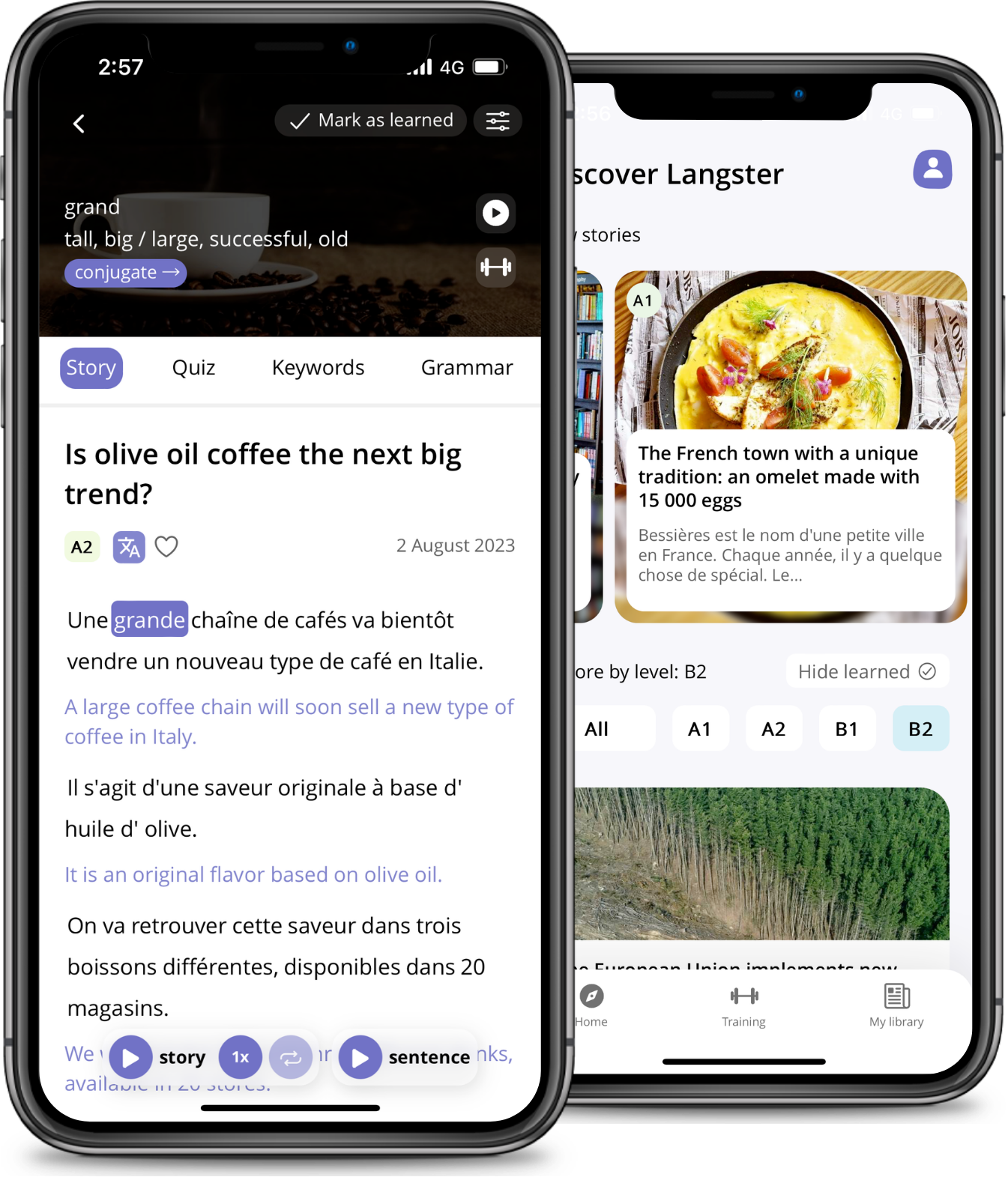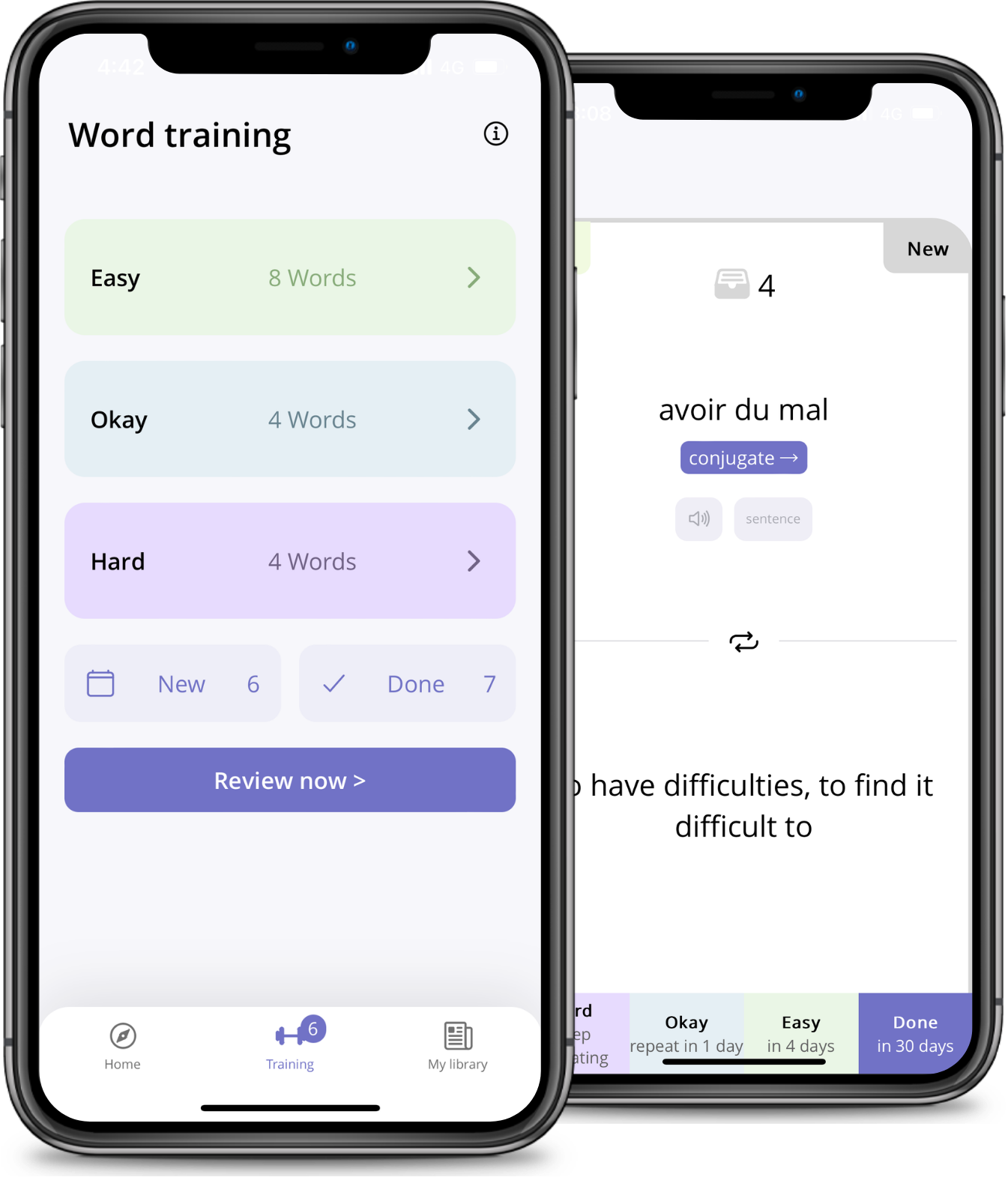Learn French Online With A1 to B2 News & Stories
- 2,000 + short articles to learn French.
- 7-day free trial. Cancel anytime.
- One account for all devices (Desktop, Mobile, Tablet).


4.8
Average Rating
100,000
Downloads
Scientifically
Proven Method
What Real Users and Professors Say About Langster:
Great App for understanding French
I love the real stories that are graded according to learning proficiency. It’s great to read these stories with some help from the cursor which reveals the word in English for me. Also for understanding the spoken word there is an audible which has two different speeds. One a normal paced speed and the other a little slower to help if the normal speed is too fast. Also includes a quiz to test your knowledge of understanding the story and a useful grammar section. I’m well pleased!
Love this learning app!
Finally, I found a wonderful learning app where I can listen and study French words and sentences within interesting stories. I hope to become fluent in French in no time! Thank you!
Hidden gem
This is probably one of the most effective language learning apps I have come across. Well graded texts with quick and easy access to dictionary and grammar explanations. Stories are not too long which enables time for a thorough review and recap.
Please more of it
I love this app and its bite-sized stories which you can dip in and out of. Thank you! (I’m now looking for a Spanish and an Italian version!)
Good to exercise listening skills
It’s so hard to understand French verbally than written, and this app is helping me hone my listening/comprehension skills and i’m making a great progress already just after a few days
Love this!
I love reading and hearing in French. This app is very helpful to see and hear examples of written and oral French. I like the quizzes and explanations!
Experience French Immersion with Thousands of Stories
Langster is your best companion for listening, comprehension & vocabulary training
Pick
one of the daily new stories in our vast library

Add
words & phrases you want to repeat

Train
with spaced repetition and help for context

Grow
and advance from French A1 to B1 in only a few weeks

Stay Motivated to Learn French with Langster

Langster
Traditional textbooks
Join +100,000 People Using Stories to Learn French
Frequently asked questions
What is Langster?
Langster is the world’s first CEFR-graded language-learning reader to learn German, French, Spanish and English. Langster provides premium, instant translations with one tap, audio from native speakers, and grammar explanations in every story.
How do I know that Langster works?
When tested on graded reading, we found that university students processed and retained vocabulary much faster when using Langster to learn language. Not only that, but they also enjoyed the process more compared to learning with traditional reading and listening material.
Are Langster story lessons free to read?
Users can check in occasionally to take advantage of our rotating free stories, but reading all the stories at once does cost a small fee, which we use to keep improving Langster.
Why you should learn the French language?
There are many reasons why people decide to learn French as their next foreign language: it’s spoken in many countries, it sounds nice, and sometimes one must conduct personal business in France.
There are more than 300 million people speak French on every continent combined, including Antarctica. It’s an official language in 29 countries, and the international organization of French-speaking nations, the OIF, includes 88 states and governments as its members. As stated before, it's one of the most widely learned and spoken languages in the world.
This means that if you speak French you would most likely be able to communicate with people in many places, wherever you go, and be part of the daily interactions and transactions occurring in French on every continent. This is a fantastic asset not only for traveling but also for expanding your career.
How long does it take to learn French?
If you're wondering how long it takes to learn French, the answer depends on factors like a prior language learning experience, study time, and immersion opportunities. It takes approximately 600-750 hours to reach a B2 level of proficiency in French. However, individual progress may vary.
To expedite learning, immerse yourself in French-speaking environments, practice with native speakers, and utilize diverse language resources. Consistency and motivation are crucial. Langster accompanies you on your French learning journey. With dedicated effort, you can improve French at a lightspeed.
What should you know about French grammar?
When it comes to French grammar, there are several key aspects that learners should know.
Firstly, French is a Romance language that employs gendered nouns, with each noun being either masculine or feminine. Adjectives, articles, and other modifiers must agree in gender and number with the nouns they modify.
Secondly, French has a complex system of verb conjugations. Verbs are conjugated based on the subject, tense, mood, and voice. There are regular and irregular verbs, and mastering verb conjugations is essential for constructing accurate sentences.
Thirdly, French employs a variety of verb tenses, including the present, past, future, conditional, and subjunctive. Each tense has its own set of conjugation rules and usage, and understanding how and when to use these tenses is crucial for effective communication.
Additionally, French utilizes a range of pronouns, including subject pronouns, object pronouns, possessive pronouns, and reflexive pronouns. These pronouns play a crucial role in sentence construction and indicate the relationships between different elements.
Furthermore, French has a specific word order, generally following the subject-verb-object pattern. However, word order can be flexible, particularly in questions and with certain sentence structures.
Lastly, French has a series of grammatical rules governing the use of articles, prepositions, and adjectives. These rules determine how these elements interact with nouns and other parts of speech.
While French grammar can be complex, consistent practice, exposure to the language, and utilizing resources such as Langster, and online courses can greatly aid in understanding and mastering the nuances of French grammar.
Why is learning French so hard?
Learning French can be challenging due to several reasons.
Firstly, the pronunciation with its nasal sounds and liaisons can be difficult for non-native speakers.
Secondly, French grammar is intricate, involving gendered nouns, verb conjugations, and various tenses.
Additionally, the speed of spoken French and the presence of idiomatic expressions can pose comprehension challenges. However, with dedication, practice, and immersion, overcoming these difficulties and achieving fluency in French is possible.
Remember, language learning requires consistent effort and exposure to authentic materials to develop proficiency.
What is the best way to learn French?
The best way to learn French varies depending on individual preferences, but here are some effective methods:
- Immersion: Surround yourself with the French language through living in a French-speaking country, consuming French media, and practicing conversations with native speakers.
- Language Classes or Courses: Enroll in structured French classes or online courses that provide comprehensive learning materials and opportunities for interactive practice.
- Language Exchange: Find language partners or join language exchange programs to practice speaking with native French speakers while offering to teach them your native language.
- Language Apps and Online Resources: Utilize language learning apps and online resources such as Langster who offer interactive exercises, vocabulary drills, and flashcard training.
- Consistent Practice: Dedicate regular time to practice French, including listening, speaking, reading, and writing, to build and reinforce language skills.
- Cultural Immersion: Explore French culture, literature, films, cuisine, and engage with cultural events to deepen your connection to the language.
Remember, everyone learns differently, so it's important to find the methods that suit your learning style and goals. Stay motivated, practice regularly, and enjoy the journey of learning French!
French Culture
The French are known for their wine, food, and fashion, but there is so much more to French culture than that. Whether visiting France or talking to French people somewhere on the internet, you can encounter many challenges, even during essential daily encounters.
These are, for example:
- Addressing someone correctly
- Choosing an appropriate topic for conversation
- Sticking to basic social politeness
Generally speaking, the French are very formal people – even among friends, they usually stick to polite formality. There are exceptions to this rule, but in general, you should avoid being too informal when talking to someone you don’t know well.
There is so much more to French culture; from their love of food and wine to their slower pace of life, the French have much to offer visitors and tourists.
French Food
You may already know that food is an important part of French culture. In fact, the French say that “food is the best way to understand a culture.” This is because food is more than just a means of sustenance – it is a way to express identity, traditions, and values.
When it comes to food, the French have a strong preference for quality over quantity. French dining etiquette stresses the importance of food being enjoyed slowly and savored with friends and family. This is why French cuisine is famous for its elaborate meals that can take hours to prepare and eat.
Food is not the center of the meal, though; every part of the dining process is taken into account, and each is important. Welcoming guests, purchasing the correct products, setting the table, and pairing the food with wine – these are just a few of the many points that make French food culture distinct.
French cooking is recognized around the world, and every French region has distinct dishes that many non-French people are familiar with, such as Boeuf Bourguignon, Coq au vin, or Crème Brulée.
Business French
When it comes to learning business French, there are a few key facts to keep in mind.
Firstly, business French is distinct from regular French, tailored specifically for professional communication with differences in vocabulary and style.
Secondly, mastering new business-related vocabulary is essential for effective communication in the professional sphere. While fluency is not necessary, combining business phrases with basic vocabulary and grammar can enable you to engage in business conversations.
Lastly, business French may be useful in various settings, such as when visiting a French-speaking country, studying abroad, writing a CV or cover letter, composing official emails, giving presentations, or reading business articles. By understanding these fundamentals, you can confidently navigate the world of business in French.
Funny French words
French, like any language, has its share of amusing and quirky words. Here are a few examples of funny French words:
- Chapeau (pronounced "sha-poh"): This word means "hat" in French, but it is often used informally to express admiration or congratulations. It's like tipping your hat to someone for a job well done.
- Grognon/Grognonne (pronounced "gro-nyon/gro-nyon"): These words mean "grumpy" or "grouchy" in French. They can be used to playfully describe someone's mood or temperament, adding a touch of humor to the conversation.
- Cacahuète (pronounced "ka-ka-wet"): This amusing word means "peanut" in French. Its pronunciation and playful sound can bring a smile to your face.
These are just a few examples of the funny and entertaining words you can find in the French language. Exploring the language further will uncover many more delightful and amusing vocabulary options.


